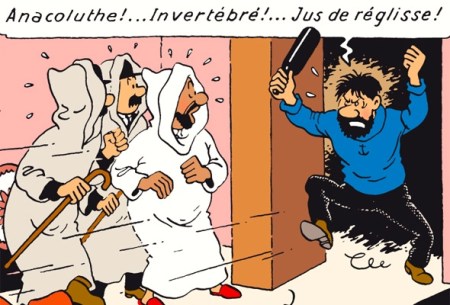A recent Language Log posting by Mark Liberman (“Vigilance – Cleanliness”) reproduced a cartoon of Captain Haddock, Hergé’s character in Tintin, exclaiming nonsensically:
That’s ‘thunder of/from Brest’ (the city in Brittany) and it’s not supposed to mean anything beyond exhibiting strong emotion in the Haddockian argot.
From Wikipedia, in considerable detail:
Captain Archibald Haddock (French: Capitaine Haddock) is a fictional character in The Adventures of Tintin, the comics series by Belgian cartoonist Hergé. He is Tintin’s best friend, a seafaring Merchant Marine Captain.
… At the time of Captain Haddock’s introduction to the series in 1940, the character’s manners presented a problem to Hergé. As a sailor, Haddock would need to have a very colourful vocabulary, but Hergé could not use any swear words as he knew his audience included children. The solution reportedly came when Hergé recalled how around 1933, shortly after the Four-Power Pact had come into being, he had overheard a market trader use the word “four-power pact” as an insult. Struck by this use of an “irrelevant insult”, Hergé hit upon the solution of the Captain using strange or esoteric words that were not actually offensive, but which he would project with great anger, as if they were very strong curse words. These words ranged across a variety of subject areas, often relating to specific terms within scientific fields of study. This behaviour would in later years become one of Haddock’s defining characteristics.
The idea took form quickly; the first appearance of the Haddockian argot occurred in The Crab with the Golden Claws when the Captain storms towards a party of Berber raiders yelling expressions like “jellyfish”, “troglodyte” and “ectoplasm”.
As a result, Captain Haddock’s colourful insults began to include “bashi-bazouk”, “visigoths”, “kleptomaniac”, “sea gherkin”, “anacoluthon”, “pockmark”, “nincompoop”, “abominable snowman”, “nitwits”, “scoundrels”, “steam rollers”, “parasites”, “vegetarians”, “floundering oath”, “carpet seller”, “blundering Bazookas”, “Popinjay”, “bragger”, “pinheads”, “miserable slugs”, “ectomorph”, “maniacs”, “pickled herring”; “freshwater swabs”, “miserable molecule of mildew”, and “Fuzzy Wuzzy”, but again, nothing actually considered a swear word.
In addition to his many insults, the most famous of Haddock’s expressions relate to any of a number of permutations of two phrases: “Billions of bilious blue blistering barnacles!” (“Mille millions de mille milliards de mille sabords!”) and “Ten thousand thundering typhoons!” (“Tonnerre de Brest!”). Haddock uses these two expressions to such an extent that Abdullah actually addresses him as “Blistering Barnacles” (“Mille sabords” in the original version).
From Crab with the Golden Claws:
Anacoluthon! Invertebrate! Licorice juice!
In the early days of Tintin, as here, Captain Haddock was something of an alcoholic reprobate, but he sobered up and became a dependable, if irascible, friend and companion to Tintin.
That brings us to the wonderful word réglisse ‘licorice’ — and the licorice plant. From Wikipedia:
Liquorice, or licorice, … is the root of Glycyrrhiza glabra from which a sweet flavour can be extracted. The liquorice plant is a legume native to southern Europe, India, and parts of Asia. It is not botanically related to anise, star anise, or fennel, which are sources of similar flavouring compounds.
(Botanical Illustration of Glycyrrhiza glabra from Flora von Deutschland, Österreich und der Schweiz 1885)
Note the characteristic pea-like flower.
More from Wikipedia:
The word liquorice / licorice is derived (via the Old French licoresse) from the Greek γλυκύρριζα (glukurrhiza), meaning “sweet root”, from γλυκύς (glukus), “sweet” + ῥίζα (rhiza), “root”, the name provided by Dioscorides. It has been traditionally known and used as medicine in Ayurveda for rejuvenation.
… Most liquorice is used as a flavouring agent for tobacco.
… Liquorice flavour is found in a wide variety of candies or sweets [licorice sticks, for example]. In most of these candies, the taste is reinforced by aniseed oil so the actual content of liquorice is very low.
… Liquorice is also very popular in Syria and Egypt, where it is sold as a drink, in shops as well as street vendors. [Jus de réglisse!] It is used for its expectorant qualities in folk medicine in Egypt.
Some licorice sticks:
[Note: the (very substantial) inventory of food postings on this blog has now been moved from my computer to public access as a Page on this blog, under Lists.]




May 11, 2016 at 7:10 am |
Actually, “Tonnere de Brest” is — as per French Wikipedia — a reference to the regular cannon fire from the arsenal outside Brest Castle.
May 11, 2016 at 7:21 am |
I didn’t say otherwise. I gave a literal translation, without telling the more specific story (which, it seemed to me, wasn’t relevant to Captain Haddock’s language).